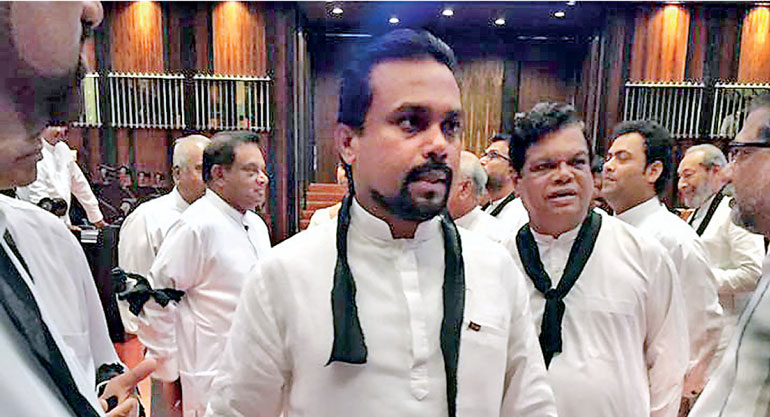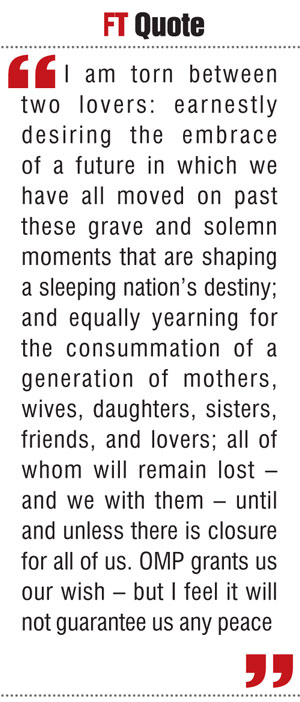Sunday Feb 22, 2026
Sunday Feb 22, 2026
Friday, 19 August 2016 00:01 - - {{hitsCtrl.values.hits}}

RAGE AGAINST THE DYING OF THE LIGHT – The debacle in the House last Friday pales in comparison with the desolation suffered (and still being experienced) by a lost generation of Sri Lankans today. While passing and/or blocking bills is part of a canny and capricious game played by cynical politicos, there is no doubt that the passage of the missing persons bill brings with it an unprecedented opportunity for closure
It’s been barely a week since the controversial Office of Missing Persons (OMP) Bill was passed – some contend that it was done so irregularly – in and through the House. Since then every shade of political actor (and some of them are rather shady, indeed) has shared with all and sundry an unequivocal opinion on its import and impact. Some have welcomed it as Sri Lanka taking its first  “baby steps” towards maturity as a truly democratic republic where people matter and their will and pleasure – to say nothing of rights – are enshrined in the supreme law of the land. But others have condemned it in their customarily chauvinistic style as being yet other unconscionable “betrayal” of the nation’s “sovereignty”. In-between these extremes, the mass of men and women who lead lives of quiet desperation remain ignorant (“we don’t know”) and apathetic (“we don’t care”) as regards OMP.
“baby steps” towards maturity as a truly democratic republic where people matter and their will and pleasure – to say nothing of rights – are enshrined in the supreme law of the land. But others have condemned it in their customarily chauvinistic style as being yet other unconscionable “betrayal” of the nation’s “sovereignty”. In-between these extremes, the mass of men and women who lead lives of quiet desperation remain ignorant (“we don’t know”) and apathetic (“we don’t care”) as regards OMP.
The responses of a plethora of political animals must give the common or garden citizen – that quintessential political actor, if only he or she grasp it – space for pause. Here is a bill become law which will throw open a window on Sri Lanka’s future with the same momentum that will force open a door to Sri Lanka’s past. The French have a phrase which aptly sums up the spirit of this inertia: “reculer pour mieux sauter”. This means that as a nation, state, country, and people, we have – through the agency of our votes and the instrumentality of our elected representatives – taken a dual-directional step. It is a step taken backward in time, so that we can take a running leap forward into space. It is a quantum leap which would have been unthinkable as recently as two years ago, and may well be unimaginable if night falls again and we return to a reinforced dark age in which antidemocratic forces militate against the republicanism we now know and are still growing accustomed to. It is a movement against which forces which cannot (or stubbornly, selfishly, refuse to) imagine our island-nation – as many, if not most, of right-thinking citizens are reimagining it these days – are agitating now as they have done in the past...
Preamble
Perhaps it is the genesis of the OMP Bill which gives these ‘patriots’ (the term is used lightly, in the same vein in which nationalism is the last refuge of the scoundrel) pause. There is little if any doubt that the origins of the reality of ‘missing persons’ comes from human nature – not natural national hubris or normal international hypocrisy. We made war upon ourselves. We made persons inimical to our respective and successive cases and causes disappear.
On the other hand, the undertaking to account for this egregious reality has its roots in Sri Lanka’s once latent and now nascent desire to be re-included in the human race. That those international networks of nations and vested interests which agitate for or against these desires are first-rate scoundrels themselves is neither here nor there. N’importe: “it is of no consequence”; to borrow another fine French phrase. The reality is that neither a Blair nor a Bush would ever be asked to account for persons missing in Afghanistan, or dead in Iraq, or abducted in the course of ‘humanitarian intervention’ in failed democracies far from their natural bourne such as Libya; while a Bandaranaike-Kumaratunga cabal, or Rajapaksa clan, or Sirisena-Wickremesinghe coalition, may well be. The claque of learned political professors kicks against the pricks in protesting Western hypocrisy. ‘Methinks the lady – or ladies – doth protest too much…’
Purpose
The stated objectives of the OMP Bill (OMPB) encompass what, superficially at least, appear to be a panoply of salutary goals. These (per Clause 10 of OMPB, here paraphrased) include a. tracing, searching, locating missing persons; b. clarifying the relevant circumstances of the abduction/disappearance and determining the respective citizen’s fate; c. recommending pre-emptive measures to prevent the repetition of such incidents; and d. identifying remedial measures and implementing appropriate redress.
That academics, professionals, and professional political actors have decried these developments and determinations comes as no surprise. Less learned folks than they have intuited that OMPB comes as an external imposition as much as an impelling sui generis. This is accompanied by pitfalls for political ambitions – past, present, future – that hinge on the sacrosanctity of Sri Lanka’s military machine.
Of course our professorial types are justified in feeling the heat being turned up, claiming as they do that the OMPB would facilitate  a witch-hunt whereby defenders of national integrity, etc., would be tarred and feathered as war criminals and arbitrarily arrested and incarcerated. That the wicked flee even when no one pursues them, as the ancient wisdom captured by certain scriptures proclaim, is proven by this pusillanimity on the part of those who protest against the persecution that has not yet fallen. O the wicked flee, especially as the pursuit heats up!
a witch-hunt whereby defenders of national integrity, etc., would be tarred and feathered as war criminals and arbitrarily arrested and incarcerated. That the wicked flee even when no one pursues them, as the ancient wisdom captured by certain scriptures proclaim, is proven by this pusillanimity on the part of those who protest against the persecution that has not yet fallen. O the wicked flee, especially as the pursuit heats up!
Process
They may have more than a Joint Opposition point, though, about the ways and means employed to pass the contentious legislation into law. There were, as has been alleged, cracks in the plaster of Parliament’s face and faces cracked into un-Parliamentary smiles as the powers that be proved themselves as good – or as bad – as the Joint Opposition in filibustering to get governmental must-dos shuffled past Mr Speaker. But where were these principled protestors militating in favour of due process when they were on the other side, as it were, and the powers that be in their day and age were guilty of far worse than gerrymandering to rush unprincipled legislation into undemocratic yet constitutional writ? Non! Non! As the French would say by shaking their heads: We must not take these agents provocateurs too seriously! It is against the process they contend, these flies. But this time round they were as flies, indeed, to wanton boys, being crushed for sport by government ranks and governmental tanks in all aspects of the parliamentary battlefield that day a week ago. Government, it seems, can give as good as it gets, and the Joint Opposition got a comeuppance that had been coming their way since they shamelessly sought to stymie everything mandatory to Good Governance since 19A and the RTI Bill…
Potential
One might reiterate at this juncture that Sri Lanka has been on the cusp of restored statehood as it never was since the end of the war in 2009. But the powers that then were – in a bedlam of cupidity and corruption lacking integrity as governors of a common weal – squandered a capital opportunity to push forward from being merely a post-war country into a post-conflict nation. That paradise lost is being repossessed, bit by inch by bill by law, by a movement that seems to be – slowly but surely – coming into its own as a machine to rescue the island from the doldrums into which it had lapsed for decades. True it is that these men are by no means perfect and sometimes display traits that run alarmingly parallel to the less despicable character of their predecessors. Be that as it may, for better or for worse, by hook or by crook, pushed by internationalism or compelled by their own integrity, they are driving the nation-state in a direction from which it would be difficult – indeed, disastrous – to deviate.
Postscript
One would do well to proceed with a sense of cautious optimism. There be dragons in the comeliest of caves. That the movement could boomerang on its originators must have no doubt crossed their collective consciousness. It would behoove our governors to remember that there are skeletons in the closet of the cleanest of administrations. A thorough, impartial, and unimpeded exhumation of Sri Lanka’s body politic as it lies smouldering in the grave of a badly compromised past of wars, insurgencies, and riotous rebellions will yield more than an indication of where the corpses lie – It runs the risk of exposing present interlocutors for the horrors and hypocrites they are; a risk the incumbents appear willing to take… Or reflect a task they want to appear willing to undertake for the sake of integrity or internationalism. My mind’s eye, however, conjures up spectres that discompose my midnight reveries and repose alike. I am torn between two lovers: earnestly desiring the embrace of a future in which we have all moved on past these grave and solemn moments that are shaping a sleeping nation’s destiny; and equally yearning for the consummation of a generation of mothers, wives, daughters, sisters, friends, and lovers; all of whom will remain lost – and we with them – until and unless there is closure for all of us. OMP grants us our wish – but I feel it will not guarantee us any peace.